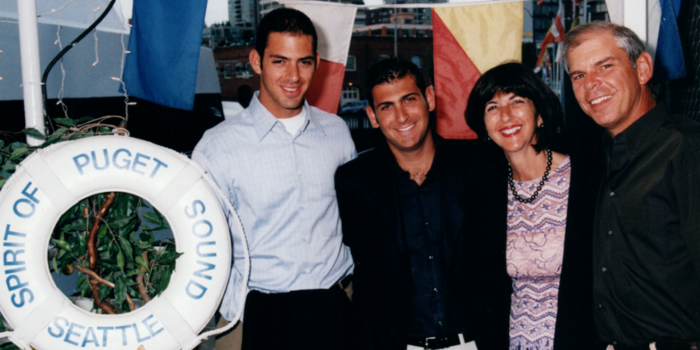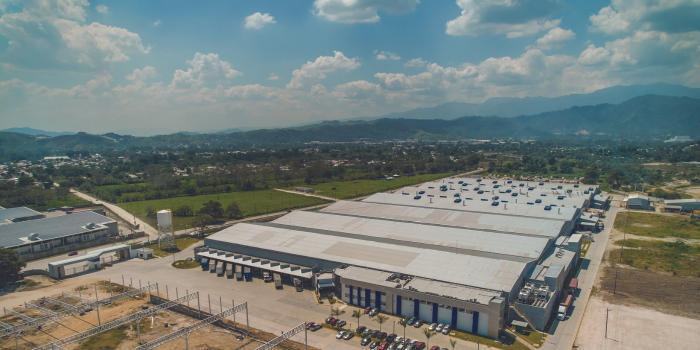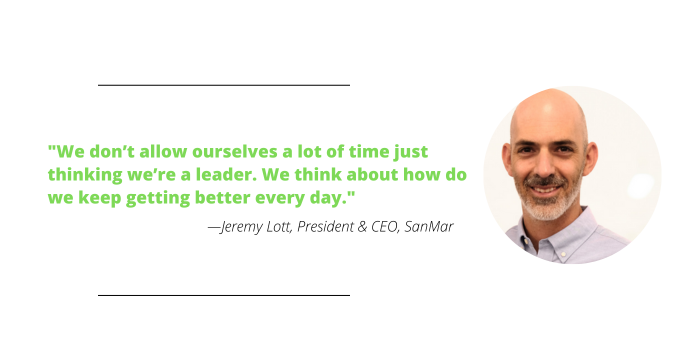SanMar: The Making Of A Dynasty
On a Monday afternoon in mid-May, Jeremy Lott is drifting through SanMar’s (PPAI 110788, S16) five-story Issaquah, Washington, office like he would his own house.
Giving a tour of the suburban hillside building to our PPAI Media contingent, he is versed on what is stored in each side closet and the work being done around every cubicle corner. Look, these are fabric swatches from the current product line. Over there is an inspiration board for spring 2025 fashions. This machine tests the color of fabric under different lighting. And here is how it works.
He is one of the most powerful people in the promotional products industry, yet seems to know fine details on everything going on around him in the SanMar operation, a swirling summation of 5,500 global employees that collectively ship upward of 100,000 parcels of branded apparel a day. What’s more, he has a keen grip on his customers’ experiences. He regularly drops in on key clients and may stand for hours to greet those who visit his booth at The PPAI Expo each January.
“SanMar was a small family business when I was a kid, so we really grew up working in the business,” says Lott, now 10 years into his role as the company’s president, and five years since he added the CEO title. “After college, I went and worked outside the business for a few years, went to business school, but I’ve been here for now 20-plus years full time, and the only way I knew how to run the business was the way my dad ran the business – to really be engaged and hands-on.
“For me, if I don’t have a good handle on the business, if I don’t have that knowledge, if I’m not traveling, if I’m not seeing it, I can’t be an effective leader. It’s just the only way that I’ve ever known how to manage the company.”

Lott is at ease taking the headshot photo that appears on the July cover of PPAI Magazine. He’s cool with the big conversation on what SanMar represents in the promotional products market, why it is so firmly entrenched as the largest supplier, and on the future of the industry.
But his mind is also free enough to have perfect clarity on whatever seemingly small detail is right in front of him. He pauses before sitting down at a conference table and offers the final go-ahead on plans to have T-shirts printed and delivered to every headquarters employee the next morning should Seattle’s new NHL team, the Kraken, win their playoff Game 7 against the Dallas Stars tonight. With the Kraken playing so well in only their second season, hockey fever has swept the entire Pacific Northwest.
Although we’re visiting from Texas, our group is not here to talk about hockey.
As Lott knows, we’ve spent the last several months conducting research into the top companies in the promotional products industry. We’ve sought to define not the largest enterprises, but the leaders, the ones that are best positioned for the future and represent comprehensive excellence in all the ways a firm might aspire: revenue, growth, responsibility, innovation, industry faith, online presence – even employees’ happiness and professional development.
And SanMar has won, we tell him. SanMar is the No. 1 supplier in the first-ever PPAI 100 ranking of the industry leaders.
Lott is gracious. He is humble. But he is not surprised. “It was the headshot that gave it away,” he says with a smile.
But one must wonder if he ever really had a doubt, going back to the first phone call he received explaining the new project, now the highest honor PPAI bestows on member companies.
SanMar is that strong. But it wasn’t always.
 Lotts to like (from left to right): Jeremy, his brother Jordan, parents Sharon and Marty. Jordan Lott is president of Lake Washington Partners, the family-owned real estate business.
Lotts to like (from left to right): Jeremy, his brother Jordan, parents Sharon and Marty. Jordan Lott is president of Lake Washington Partners, the family-owned real estate business.
The Business Is Personal
Whatever supplier would’ve ranked as the No. 1 industry leader when SanMar was founded in 1971 surely had no way of knowing what would hit them.
Marty Lott, Jeremy’s father, started the company as a capstone to his business degree from the University of Washington. He worked out of the basement in his dad’s office. With his wife, Sharon, at his side, he made a good business in his 20s while traveling in search of great products to import and sell.
One particular order of 1,200 T-shirts for the Seattle SuperSonics basketball team proved pivotal. When the shirts came in from one of the wholesalers Marty used for large orders, they were a mismatch of fabrics and different shades of yellow. He asked the company to make it right, only to be dismissed rudely. The deal was done, they told him.
That night, he talked to Sharon about the incident, and she insisted that he could do a better job supplying and printing on blank shirts and taking care of customers.
Even now in 2023, with Marty Lott retired, the corporate culture at SanMar is built around a narrow set of family values established in those early days: Be nice and tell the truth. The business is personal, they say at SanMar.
What is interesting is the way those cultural mandates have molded the company into the multifaceted industry leader that it is.
“Those aren’t just things that SanMar says, they’re actually things that come through in everything we do,” says Shelley Williams, who joined the company in 2019. As VP of marketing, she says her job “isn’t trying to make up what the brand stands for, it’s really about trying to just articulate what the company already does organically.”
![]()
![]()
![]()
![]()
![]()
Fashionably Early
Although it is privately held and keeps its books closed, SanMar is widely known as the largest company in the promo industry. PPAI Research estimates it brought in $3.7 billion in sales last year and has grown its annual revenue by 51% in just the last three years. Of the 50 suppliers in the inaugural PPAI 100, SanMar earns high marks – scores among the best of the best, in other words – for revenue and growth, but also for its online presence, responsibility and innovation.
The technology prowess is one example of how SanMar’s cultural values spur its success, making it an early adopter and on the cutting edge of practices that eventually become standard throughout the industry. SanMar was one of the first suppliers to track inventory with computers.
“My dad always says if you don’t know the truth, you can’t tell the truth,” Lott says. “Somebody calls you and wants to order 500 yellow T-shirts. If you don’t know that you have them in stock, it’s hard to say yes.
“Fast forward 50 years, technology is a key piece underpinning everything we do. We have hundreds of millions of units in stock, and we need to keep track across all of these [fulfillment] sites, advanced material handling systems and robotics. We’ve shifted almost all of our systems to be in the cloud, and we think a lot about cybersecurity and all of those things today. For us to be able to manage the business at its size and complexity, it’s what we have to do.”
READ MORE: See the full PPAI 100 rankings.
SanMar has likewise been on the forefront of the promo industry’s sustainability revolution and other forms of corporate social responsibility at home and throughout its supply chain.
Chief Product Officer Pat Noonan rattles off the company’s involvement in CSR initiatives as if they were his children’s names. There’s the Science Based Targets initiative, the Fair Labor Association, the Better Buying organization, Sustainable Apparel Coalition, Accelerating Circularity – it goes on. “There’s a whole long list,” Noonan says. “Back to where we are different from other players, and where we are, call it quietly leading from our little place here in Issaquah, Washington.”
Lott says the intense focus on a positive supply chain began before he arrived as a full-time employee. By the late 1990s, a spotlight was being shined on major brands that derived their products from child labor.
“We recognized that as soon as this shirt left our warehouse and it got a logo, it stopped being a SanMar shirt, and it started being pick-your-organization,” he says. “We had a responsibility to those people to make sure that that product was made in a responsible way.”
In the years since, the company has taken a proactive approach to more than the products themselves. The 2013 Rana Plaza collapse in Bangladesh was an eye-opener for Lott. More than 1,100 people died in the garment factory disaster. While SanMar products weren’t in that factory, it wouldn’t be implausible to think that they might have been.
“There was an old saying in garment production: It wasn’t the factory you thought your product was produced in that was the problem, it was the one you didn’t know, because products would get outsourced,” Lott says. “When that happened, it was a soul-searching moment for me. I thought, gosh, are we part of this global problem that is exploitive of people, that’s dangerous, that’s unsustainable?
“We made a really conscious decision as a company ... to say it’s not good enough for us to just not do bad things and have an auditing program to make sure we’re not doing bad things. We need to make sure that we are doing good things in the world and that we are a positive influence in the communities of the people who make our products and for our customers and the communities that they’re in.”
SEE THE VIDEO: This Is Not A T-Shirt Company
This idea became the basis for what has evolved into SanMar’s current motto, "Together, for Good." Along with the impact it aims to make in the places where its products are sourced and manufactured, the phrase also defines SanMar’s hope for the length of the vendor and client relationships it develops.
 SanMar's Honduras facility, pictured here, is a major hub of its international operations. Domestically, the company has nine national distribution centers for a combined 7.85 million square feet of space.
SanMar's Honduras facility, pictured here, is a major hub of its international operations. Domestically, the company has nine national distribution centers for a combined 7.85 million square feet of space.
Growing Together
When Mike Knapick joined SanMar as its chief information officer in 2014, the company was run on a homemade enterprise resource planning system. It handled SanMar’s unique needs just fine, albeit with more manual processes than were ideal. But SanMar was growing quickly, and by the end of 2017, a decision had to be made. Knapick says, “One of the conversations that we had was to think about where we wanted to be in 10 years and ask is what we’re built on right now going to be able to support whatever we think it is we’re going to be?”
Business has nearly tripled since that point, based on estimates, with another four years still to go until the 10-year mark of the decision to launch a new ERP. SanMar’s Microsoft Dynamics system went live on May 4, 2020. Knapick now speaks in terms of the company’s goals in 20 to 50 years.
If its ability to handle the surging order volume has digital solutions, there is also the physical element worth considering – how such a volume of goods can be moved from place to place at a speed that meets expectations. As the company began to grow in the late 1970s, Marty Lott viewed SanMar as an inherently logistical operation. Jeremy Lott now brings a more personal focus to SanMar’s line of some 3,000 products, but the need to keep up with demand has only increased.
John Janson, SanMar’s VP of global logistics, says the relationship-focused mindset the company brings to its operations is at the core of its fulfillment efforts.
Whereas PPAI 100 suppliers as a whole ship orders on time 97% of the time, SanMar does so 99% of the time. The key is in the company’s approach to dealings with its ground and ocean carriers, allowing it to maintain preferred status when shipping containers are hard to come by during a pandemic or a ground carrier’s capacity is weakened by labor strife.
“We’ve really taken that overall SanMar strategy – that business is personal – and driven that all the way up into the supply chain,” Janson says. “We talk about it all the time, doing the right thing by the carrier. We’ve renegotiated with UPS a couple times since I’ve been here, and we didn’t do it by threatening them with another carrier. We did it by talking about our business and how can we be more strategic with them, and how can they help us take costs out and improve the service to our customer.”
DIDN'T GET THIS IN YOUR EMAIL? Subscribe to PPAI Newslink.
To a vendor the size of UPS, even promo’s largest company is far from the biggest client. Janson says, “Our size is not the greatest thing. We’ve really made the business meaningful.”
SanMar is able to pass off the benefit of that reciprocity through its supply chain to distributor clients, another set of relationships it doesn’t take for granted.
Two weeks before our meeting in Issaquah, Lott sat in the showroom of a distributor in Arizona, meeting with the principal and key sales and operations employees.
“I said I really want to learn about your business, but I want to learn how SanMar can be a better partner,” he says. “It’s great to hear the good things, but share with me our challenges. ... And for about an hour and a half, I really heard it – everything that we could be doing better. But it was fantastic. I came back, and the next day I had the whole leadership team in this room with a list of all the things I heard from that customer.”
Thinking Long-Term
Asked about his proudest moments in the business, Lott mentions employees who told him they just paid off their mortgages, along with the school SanMar built in Honduras near its factory there. But he also mentions the seamless evolution from SanMar’s founding generation. “It’s not just my dad,” he says. “The leadership team that my dad had 10 years ago pretty much all retired as well, and so we have a new, next generation of leadership at SanMar. We’ve been able to transition really successfully.”
Jeremy Lott won’t turn 50 until 2026. He and his wife Jessica have six children. Although it’s too far out to be thinking of the next leadership transition, he says it’s important to him to preserve SanMar as a family business. As with anything at SanMar, the thinking is long-term. He says that the “vast majority” of profits are put back into the business.
It would appear that the company is just getting started.

Toward the end of the interview, we ask Lott how cognizant he is of his and SanMar’s leadership status in the industry.
“Honestly, it’s only really when we do things like this,” he says. “We don’t allow ourselves a lot of time just thinking we’re a leader. We think about how do we keep getting better every day.”
Our interview wraps in time to catch the end of the hockey game. Despite allowing a goal in the final minute, Dallas holds onto a narrow lead and advances to the next round of the playoffs, eliminating the Seattle upstarts. There will be no Kraken T-shirts waiting for employees when they reach their desks in the morning.
No matter. Lott had the shirts printed anyway and will give them out when the NHL season opens back up in the fall.
There’s always next year.
Ellis is the publisher and editor-in-chief at PPAI.

